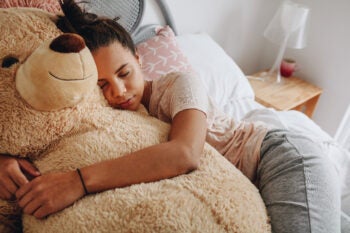Home / Health & Wellness Articles / Tips and Life Hacks /
Why Sleep Matters: The Essential Role of Rest in Health and Well-Being

In our fast-paced world, sleep can tend to take the backseat to things like work, social activities, and screen time. Yet, the importance of good sleep cannot be over emphasized. Adults typically need seven to nine hours of sleep while kids need between eight and twelve, depending on their age. A 2023 study by the National Council on Aging found that more than one third of Americans report getting less than seven hours of sleep in a given 24-hour period. Quality sleep impacts our physical and mental health and well-being, our overall productivity, our brain function as well as our ability to fight off certain diseases. The first step in making sleep a priority is understanding why it is important and how to create an environment where quality sleep is possible.
“Sleep is important for our physical and mental health in many ways,” says Brittany McCrady, Licensed Clinical Social Worker at Centerstone, “It gives our bodies and minds a chance to reset and rejuvenate.” When we sleep, our minds take time to process the events of our day even though we aren’t doing it consciously. Sleep also gives our muscles time to heal from the day’s movement, and gives our minds a break from external stimulation.
When we don’t get enough quality sleep, there can be prolonged effects on our minds and bodies. These effects may include:
- Feeling more moody, sensitive, and irritable
- Trouble regulating mood and lower frustration tolerance
- Physically and mentally fatigued
- Decreased productivity
- Offset daily routine
- Decreased function of the immune system
A key ingredient to get quality sleep is having a comfortable sleep environment, as well as a set nighttime routine. McCrady recommends cutting out screen time one to two hours before bedtime, “blue light, stimulation, and sound are a lot to wind down from, and may make falling asleep harder to do.” It may also be beneficial to limit food and water intake before bed because when we eat or drink, we are stimulating our digestive system to be at work when the whole body should be winding down.
Additionally, it is crucial that your sleep environment be cool and dark. Many experts have found that the best temperature range is between 60 and 67 degrees Fahrenheit. A cooler room helps your body temperature drop while you sleep, which can help you fall and stay asleep. Some people like to have background noise as they sleep while others favor silence. If you do prefer background noise, McCrady advises against music or television. “Music and TV keep the brain stimulated, which may impact the quality of your sleep. This is why I recommend static noise instead.” There are different apps and devices that have a variety of static noises to choose from.
If you find it hard to fall or stay asleep due to racing thoughts or anxiety, it may be helpful to keep a journal beside your bed to jot down those thoughts. Sometimes just the simple act of getting the racing thoughts out of your head and on to paper can be enough to ease the anxiety and fall sleep.
If you are having a hard time sleeping and feel that it is negatively impacting your mental health, Centerstone can help. Visit our counseling services page or call us at 877-HOPE123 (1-877-467-3123) to learn more.


